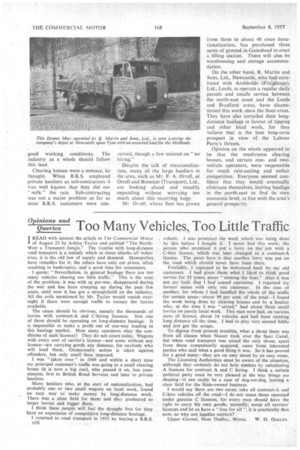Opinions and
Page 72

If you've noticed an error in this article please click here to report it so we can fix it.
Queries Too Many Vehicles Too Little Traffic I READ with interest the article in The Commercial Motor I of August 23 by Ashley Taylor and entitled "The NorthWest a Transport Jungle." The trouble with long-distance road transport is a malady which at times attacks all industries; it is the old law of supply and demand. Monopolies have remedies for it; the others have only cut prices, often resulting in 'bankruptcy, and a good time for consumers.
I quote: "Nevertheless, in general haulage there are too many vehicles chasing too little traffic." This is the crux of the problem; it was with us pre-war, disappeared during the war and has been creeping up during the past few years, until now it has got a stranglehold on the industry. All the evils mentioned by Mr. Taylor would vanish overnight if there were enough traffic to occupy the lorries available.
The cause should be obvious, namely the thousands of lorries with contract-A and C-hiring licences. Not one of them should be operating on long-distance haulage. It is impossible to make a profit out of one-way loading in this haulage market. How many operators obey the conditions of such licences? They do not count today. Wagons with every sort of carrier's licence--and some without any licence—are carrying goods any distance, for anybody who will load them.. Occasionally action is taken against offenders, but only small fines imposed.
1 was "taken over" in 1949 and within a short time my principal customer's traffic was going to a small clearing house (it is "now a big one), who passed it on, less commission, first to British Road Services and later to private hauliers.
Many hauliers who, at the start of nationalization, had probably one or two small wagons on local work, found an easy way to make money by long-distance work. There was a clear field for them and they graduated to larger lorries and bigger fleets.
think these people will feel the draught first for they have no experience of competitive long-distance haulage.
I returned to road transport in 1955 by buying a B.R.S. . D26
vehicle. ,I was promised the work which was being done by this before I bought it. I never had this work; the person who promised it put a lorryon the job with a C-hire licence, which was later changed to a contract-A licence. The point here is that another lorry was put on the road which• should never have been there.
Foolishly, I expected to be welcomed back by my old customers. I had given them what I liked to think good service for 25 years, never "missing the boat." Also it was not my fault that I had ceased operating. I regained my former status with only one customer. In the case of another, for whom I had handled the whole of the traffic for certain areas—about 90 per cent. of the total—I found the work being done by clearing houses and by a haulier who, at the time 1 was "seized," had about three small lorries on purely local work. This man now had, on various sorts of licence, about 14 vehicles and had been running long distance all the time. I had to play very second fiddle and just got the scraps.
To digress from present troubles, what a shout there was from all classes when Nasser took over the Suez Canal, but when road transport was seized the only shout, apart from those compulsorily acquired, came from interested parties who said what a good thing it was. So it has proved for a good many—they are on easy street by an easy route.
The Licensing Authorities must be aware of the situation, although they certainly do not help matters by substituting A licences for contract A and C hiring. I think a certain political party must be very pleased at the way things are shaping—it can easily be a case of dog-eat-dog, leaving a clear field for the State-owned business.
I would say there are two cures; take all contract-A and C-hire vehicles off the road—I do not mean those operated under genuine C licences, for every man should have the right to carry his own goods; secondly, scrap all carrier.' licences and let us have a "free for all "; it is practically that now, so why not legalize matters?
Upper •Gornal, Near Dudley. Worcs. W. D. OAK LEY.




























































































































